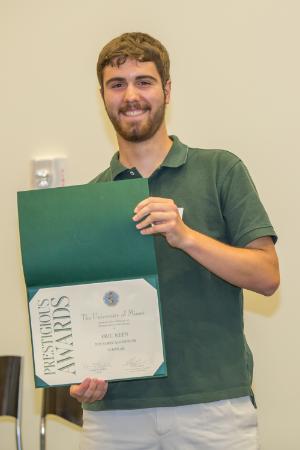Keen has been conducting research on viruses and microbial ecology throughout his time at UM, working with Research Assistant Professor of Biology James Baker and Associate Professor of Geological Science Jim Klaus.
 |
Baker said his conversations with Eric “have more in common with discussions I have with peers, or at the outside, graduate students than with anyone Eric’s age,” adding, “Eric is functioning as a professional scientist while pursuing his undergraduate degree.”
Keen’s research focuses on viruses that attack bacteria, and how these organisms – called phages – affect bacterial DNA. For his experiment, Keen collected phages at 30 locations around campus, and introduced them to drug-resistant E. coli bacteria.
His goal is to see if the phages destroy structures within the E. coli DNA called plasmids, which cause the bacteria to resist antibiotics.
“People have known about plasmids since the 1950s, but this is the first time that anyone is examining which phages affect them and how,” Keen said, adding that his work has environmental and medical applications.
Klaus said, “Eric has demonstrated a true commitment to pursuing a research career in microbial ecology. The motivation that drives this commitment is his genuine fascination with the natural microbial world, and the desire to use microbes to make the world a safe, cleaner and healthier place.”
The Barry M. Goldwater Scholarship and Excellence in Education Program was established by the U.S. Congress in 1986 to honor five-term Republican Senator Barry Goldwater. It aims to provide a steady source of highly qualified scientists, mathematicians, and engineers by awarding scholarships to college sophomores and juniors who intend to pursue careers in these fields.
Each scholarship provides up to $7,500 per year for undergraduate tuition, fees, books, and room and board.
April 14, 2015

